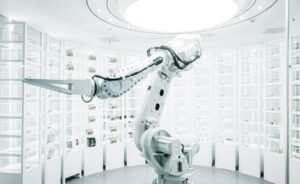AI Is Everywhere
Artificial Intelligence (AI) has become an integral part of our lives, shaping various industries and enhancing everyday experiences. From voice assistants like Siri and Alexa to personalized recommendation systems on streaming platforms, AI is transforming the way we interact with technology. This article aims to provide insights into the pervasive presence of AI and its implications in today’s world.
Key Takeaways
- AI is transforming various industries, including healthcare, finance, and marketing.
- Machine learning, a subset of AI, enables computers to learn patterns and make predictions.
- Natural Language Processing (NLP) enables AI to understand and interpret human language.
- AI-powered recommendation systems enhance personalized experiences for users.
- Ethical considerations and responsible AI practices are crucial.
The Pervasive Influence of AI
AI technology is rapidly evolving and finding its applications in almost every aspect of our lives. From autonomous vehicles and virtual assistants to medical diagnostics and fraud detection, AI has the potential to revolutionize industries, streamline processes, and improve decision-making.
*AI enables self-driving cars to navigate and detect obstacles, making roads safer for everyone.*
The Power of Machine Learning
Machine learning is a fundamental component of AI that allows computers to learn from data and make predictions without being explicitly programmed. Through the analysis of large datasets, machine learning algorithms can identify patterns and trends, enabling businesses to automate processes and make data-driven decisions.
*Machine learning algorithms can predict customer behavior and tailor marketing strategies accordingly.*
The Role of Natural Language Processing
Natural Language Processing (NLP) is a branch of AI that focuses on enabling machines to understand, interpret, and respond to human language. From chatbots providing customer support to speech recognition systems, NLP allows AI to comprehend and generate human-like language.
*NLP enables virtual assistants to understand and respond to users’ voice commands effectively.*
The Era of Personalization
AI-driven recommendation systems have become commonplace in today’s digital landscape. By analyzing user preferences and behavior, these systems provide personalized suggestions, whether it’s recommending movies on streaming platforms or suggesting products on e-commerce sites.
*E-commerce platforms use AI to offer personalized product recommendations, increasing customer engagement and sales.*
Ethics and Responsible AI
As AI continues to advance, ethical considerations and responsible practices are essential. It is crucial to ensure that AI systems are unbiased, transparent, and respect individual privacy. Additionally, AI developers and users must address concerns related to job displacement and the potential risks associated with AI misuse.
*Responsible AI development involves considering potential biases in training data to prevent discrimination.*
Data Tables and Statistics
| Industry | Percentage of AI Adoption |
|---|---|
| Healthcare | 40% |
| Finance | 35% |
| Retail | 30% |
Successful AI Implementations
- Amazon’s recommendation system
- Google’s language translation algorithms
- Netflix’s movie recommendation engine
Challenges in AI Development
- Data privacy and security concerns
- Algorithmic bias and fairness
- Regulatory and legal implications
The Future of AI
With ongoing advancements in AI technology, the potential applications are limitless. AI has the capability to transform industries, empower individuals, and address global challenges. However, ensuring ethical AI development and responsible usage will be paramount to harness its full potential.
*AI holds immense promise in solving complex problems, such as climate change and healthcare accessibility.*

AI Is Everywhere
Common Misconceptions
One common misconception about AI is that it will replace human jobs entirely. However, this is not entirely accurate. Here are some relevant points to consider:
- AI is designed to assist and enhance human capabilities, not replace them completely.
- While some jobs may be automated, new opportunities and roles will emerge as AI technology advances.
- Human skills such as creativity, empathy, and critical thinking are still difficult for AI to replicate.
Another misconception is that AI is infallible and error-free. Here are some relevant points to consider:
- AI systems are built and programmed by humans, and they can inherit their biases and limitations.
- AI algorithms require high-quality and unbiased data to produce reliable results.
- AI technology is continuously evolving, and the potential for errors and biases still exists.
Some people assume that AI is only applicable in advanced scientific or technological fields. However, this is not the case. Here are some relevant points to consider:
- AI is being integrated into various industries, including healthcare, finance, education, and transportation.
- AI applications, such as chatbots, virtual assistants, and recommendation systems, are becoming widespread in everyday consumer products.
- AI is also being used in creative fields, such as art and music, to aid in the generation of unique ideas and content.
Another misconception is that AI is highly intelligent and capable of human-like consciousness. Here are some relevant points to consider:
- AI systems are designed to efficiently process and analyze vast amounts of data, but they lack human-like consciousness and understanding.
- While AI can mimic certain human-like behaviors, it still falls short in understanding context, emotions, and complex reasoning.
- The concept of general artificial intelligence (AGI), which can match or surpass human intelligence across a wide range of tasks, is still a distant goal.
Lastly, some people fear that AI will become uncontrollable and surpass human control. Here are some relevant points to consider:
- AI systems are designed and developed with strict regulations and ethical considerations to ensure their trustworthiness.
- Ongoing research is exploring methods to make AI systems more transparent and accountable, allowing humans to understand and control their decisions.
- The responsibility for AI’s consequences and actions ultimately lies with humans, who make the decisions and implement the technology.

AI in Healthcare
The use of artificial intelligence (AI) in healthcare is rapidly expanding, revolutionizing patient care and medical research. The table below showcases some remarkable applications of AI in this field.
| Application | Benefits |
|---|---|
| Medical Imaging Analysis | Improved accuracy in diagnosing diseases such as cancer, speeding up treatment decisions. |
| Virtual Nursing Assistants | Enhanced patient engagement and personalized care from the convenience of their homes. |
| Drug Discovery | Accelerated identification of potential drug candidates, reducing development time by years. |
| Electronic Health Record Management | Efficient organization and retrieval of patient data, leading to better diagnoses and treatment plans. |
| Robot-Assisted Surgery | Precision and minimal invasiveness, decreasing complications and recovery time for patients. |
AI in Transportation
The transportation industry is also leveraging AI technologies to improve safety, efficiency, and reliability. The following table highlights some fascinating applications of AI in this sector.
| Application | Benefits |
|---|---|
| Autonomous Vehicles | Reduced accidents, lower fuel consumption, and enhanced traffic management. |
| Route Optimization | Optimal navigation, minimizing travel time, and reducing fuel and carbon emissions. |
| Fraud Detection | Quick identification of suspicious activities, preventing fraudulent insurance claims. |
| Intelligent Traffic Lights | Real-time adjustment of traffic signal timings to reduce congestion and improve flow. |
| Smart Fleet Management | Efficient vehicle scheduling, maintenance, and monitoring, increasing operational efficiency. |
AI in Finance
Artificial intelligence has made significant inroads in the financial sector, enabling faster and smarter decision-making. The subsequent table presents key applications of AI in finance.
| Application | Benefits |
|---|---|
| Fraud Detection | Timely identification of fraudulent transactions, protecting individuals and businesses. |
| Algorithmic Trading | Automated trading strategies that react instantaneously to market fluctuations. |
| Customer Service Chatbots | 24/7 availability, personalized responses, and improved customer satisfaction. |
| Credit Scoring | Enhanced credit risk assessment, providing fairer lending decisions to borrowers. |
| Robo-Advisors | Low-cost, algorithm-driven investment advice catering to individual financial goals. |
AI in Entertainment
AI’s impact on the entertainment industry has been remarkable, revolutionizing various aspects of content creation and consumption. The following table presents some intriguing applications of AI in this sphere.
| Application | Benefits |
|---|---|
| Recommendation Systems | Personalized content suggestions, improving user experience and engagement. |
| Virtual Reality | Immersive, interactive experiences for gaming, films, and other forms of entertainment. |
| Content Generation | Automated creation of music, art, and storytelling, expanding creative possibilities. |
| Improved CGI | Realistic special effects in movies and animations, bringing imaginations to life. |
| Speech and Facial Recognition | Enhanced character animation, making virtual entities more realistic and relatable. |
AI in Education
The field of education has been greatly impacted by AI, transforming how students learn and educators teach. The ensuing table illustrates notable applications of AI in education.
| Application | Benefits |
|---|---|
| Intelligent Tutoring Systems | Personalized learning paths, adaptive feedback, and improved academic outcomes. |
| Automated Grading | Faster and more objective grading, saving teachers valuable time. |
| Virtual Classrooms | Accessible education worldwide, fostering collaboration and intercultural exchange. |
| Smart Content Delivery | Customized content tailored to individual student needs and learning styles. |
| Early Intervention Systems | Identifying struggling students and offering timely academic support. |
The applications of artificial intelligence are wide-ranging and continue to grow rapidly. AI’s presence is felt in healthcare, transportation, finance, entertainment, and education, among other sectors. These tables provide a glimpse into the innovative ways in which AI is transforming industries and improving various aspects of our lives. As technology advances, it is essential to harness the potential of AI responsibly and ensure we leverage it for the benefit of society.
Frequently Asked Questions
What is AI and how does it work?
AI, or Artificial Intelligence, refers to the development of computer systems capable of performing tasks that typically require human intelligence. These systems learn and improve through a combination of data processing, pattern recognition, and decision-making algorithms.
Where can we see AI in action today?
AI is present in numerous areas, including search engines, virtual assistants, self-driving cars, fraud detection systems, recommendation algorithms, and many more. It is also used in industries like healthcare, finance, manufacturing, and education to enhance efficiency and accuracy.
How does AI impact our daily lives?
AI has a significant impact on our lives, from personal assistants like Siri and Alexa to personalized recommendations on streaming platforms. It also aids in healthcare, with AI-powered diagnostics and personalized treatments, and it improves efficiency and safety in transportation and logistics.
Does AI pose any risks or ethical concerns?
Yes, AI raises various concerns, including job displacement, privacy invasion, algorithmic bias, and potential misuse of advanced AI technologies. Ethical considerations are crucial to ensure AI is developed and deployed responsibly, without compromising human rights or perpetuating discrimination.
What are the current limitations of AI?
AI technologies have limitations, such as the inability to exhibit true understanding or consciousness, difficulties in handling complex and diverse real-world scenarios, and challenges in maintaining fairness and transparency in decision-making processes.
How is AI developed and trained?
AI systems are developed through a combination of data collection, algorithm design, and model training. Training usually involves feeding the system with large amounts of labeled data, allowing it to learn from patterns and make predictions. Deep learning, machine learning, and reinforcement learning are common approaches used in AI development.
What is the difference between Narrow AI and General AI?
Narrow AI, also known as Weak AI, is designed to perform specific tasks and has limited functionality. General AI, on the other hand, refers to the development of machines that possess human-like intelligence and can perform any intellectual task that a human being can do.
How can businesses benefit from using AI?
AI offers numerous benefits for businesses, including improved efficiency, increased productivity, better decision-making, enhanced customer experiences, and cost savings. It allows organizations to automate manual tasks, gain insights from large datasets, and develop personalized marketing strategies.
How can individuals learn more about AI and its applications?
There are various avenues to learn more about AI, such as online courses, specialized AI programs, research papers, and attending conferences. Online platforms like Coursera, Udemy, and edX offer courses on AI-related topics. Additionally, following reputable AI blogs and joining relevant communities can provide valuable insights.
What does the future hold for AI?
The future of AI is exciting and holds immense potential. With ongoing advancements, we can expect AI to continue transforming industries, improving healthcare outcomes, revolutionizing transportation systems, and enabling new discoveries in areas like robotics, natural language processing, and computer vision.




